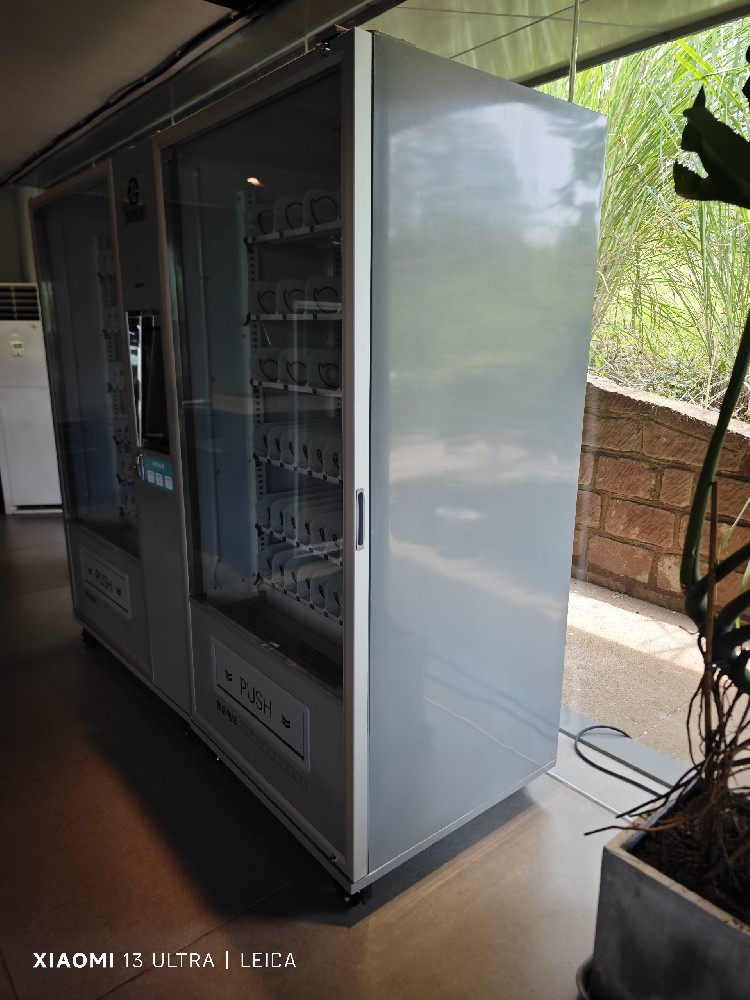In today's digital age, technology is reshaping various industries at an unprecedented pace, and the vending machine sector is no exception. Thanks to its outstanding innovation capabilities, Smart Purchase Technology has deeply integrated intelligent technology into vending machines, enabling them to demonstrate purchase value that goes far beyond imagination and making them the focus of attention for numerous commercial investors and retail operators.
I. Intelligent Interaction Experience: Embarking on a New Journey of Convenient Shopping
Smart Purchase Technology vending machines are equipped with advanced touch screens and intelligent operating systems, bringing consumers an unprecedented interactive experience. Through a simple and intuitive interface design, consumers can easily browse a wide variety of product categories, detailed product information, and attractive promotional activities. Whether they are looking for a specific beverage, snack, or exploring novel products, they can quickly complete their purchases with just a light swipe or click on the screen.
What's even more remarkable is that its intelligent voice assistant function further enhances the convenience of interaction. Consumers only need to say the name or keywords of the desired product, and the voice assistant can quickly identify and accurately locate the product, automatically completing the purchase process. This contactless shopping method not only complies with the current health-conscious consumption trend but also saves consumers valuable time. Especially in fast-paced life scenarios such as transportation hubs and office buildings, it makes shopping as easy and natural as having a conversation with an intelligent partner.
II. Precise Inventory Management: Optimizing Operational Efficiency and Costs
The built-in intelligent inventory management system is a core highlight of Smart Purchase Technology vending machines. With the help of high-precision sensors and big data analysis technology, this system can monitor key data such as the inventory quantity, sales speed, and sales cycle of each product in real-time. Operators can check inventory dynamics anytime and anywhere through mobile apps or computer-side management platforms and keep abreast of product sales situations in a timely manner.
When the inventory level drops below the preset threshold, the system will automatically send a restocking reminder and generate a precise restocking recommendation list based on historical sales data and current market trends. This enables operators to plan restocking in advance, arrange logistics and distribution reasonably, effectively avoid sales losses caused by out-of-stock situations, and also reduce the risk of inventory backlogs, maximizing the turnover and utilization efficiency of funds. For example, in densely populated places like schools and factories where consumption patterns are relatively stable, precise inventory management can ensure that vending machines always have sufficient product supplies to meet consumers' immediate needs, thereby enhancing overall operational efficiency.
III. Personalized Recommendations and Marketing: Stimulating Potential Consumption Needs
Smart Purchase Technology vending machines utilize artificial intelligence algorithms to achieve personalized product recommendations and precise marketing. Through in-depth analysis of consumers' purchase history, browsing behavior, and consumption preferences, the system can customize personalized product recommendation lists for each consumer. When consumers approach the vending machine, the screen will prioritize displaying products that match their tastes and needs, greatly increasing the exposure and purchase probability of the products.
In addition, vending machines also support the setting of diverse marketing activities, such as discounts for cumulative purchases, promotional discounts, and combo deals. Operators can flexibly formulate personalized promotional strategies according to different time periods, seasons, festivals, and specific marketing goals, and accurately push them to target consumers through multiple channels such as the machine interface, text messages, and membership systems. This personalized marketing approach not only attracts consumers' attention and stimulates their purchase desires but also enhances the interaction and loyalty between consumers and brands, cultivating a long-term and stable customer base. For example, during the hot summer, in response to the peak demand for cool beverages among consumers, vending machines can launch discount activities for chilled beverages and send exclusive offers to members who frequently purchase beverages, effectively promoting sales growth.
IV. Data-Driven Decision-Making: Facilitating Business Strategic Planning and Expansion
Smart Purchase Technology vending machines accumulate vast amounts of transaction data and consumer behavior data during their operation, and these data have become precious assets for operators to make business decisions. Through in-depth data mining and analysis, operators can gain insights into various aspects of information, such as consumers' consumption habits, preference changes, regional differences, and market trends, providing powerful data support for business strategic planning.
For example, by analyzing the sales data of vending machines in different regions, operators can discover the hot-selling trends of certain specific products in specific areas, thus providing references for product selection and stocking strategies, optimizing the product mix, and improving sales targeting. Meanwhile, by comparing sales data in different time periods, operators can evaluate the effectiveness of marketing activities, understand consumers' responses to different promotional methods, and then adjust marketing strategies to improve the return on marketing investment. In addition, based on the analysis results of the data, operators can accurately select new placement locations, expand the business coverage, and achieve the steady expansion of the business territory.
V. Remote Monitoring and Maintenance: Ensuring Stable Operation and Quick Response
To ensure the stable operation of vending machines, Smart Purchase Technology provides powerful remote monitoring and maintenance functions. Operators can remotely monitor the operating status of each machine in real-time via the Internet, including the device's network connection, power supply, temperature and humidity, and the operation of internal mechanical components. Once an abnormality is detected, the system will immediately send an alarm notification to the operators and maintenance personnel and provide detailed fault diagnosis information to help maintenance personnel quickly locate the problem and formulate a solution.
Maintenance personnel can use remote technical means to conduct preliminary troubleshooting and repairs for some faults. For problems that require on-site handling, they can also make preparations in advance, bring necessary tools and spare parts, and quickly rush to the scene for repairs. This remote monitoring and maintenance mechanism greatly shortens the downtime of the equipment, improves the availability and reliability of the equipment, reduces operational costs and maintenance difficulties, and provides a solid technical guarantee for commercial operations.
In conclusion, Smart Purchase Technology vending machines, with their outstanding performance in intelligent interaction, inventory management, personalized marketing, data-driven decision-making, and remote monitoring and maintenance, have perfectly integrated intelligent technology with commercial operations, bringing all-round value enhancement for investors and operators. Whether it is improving the shopping experience, optimizing operational efficiency, expanding market share, or reducing operational costs and risks, Smart Purchase Technology vending machines have demonstrated strong advantages and great potential. Their purchase value far exceeds that of traditional vending machines and is undoubtedly an extremely attractive investment choice in today's business field.


